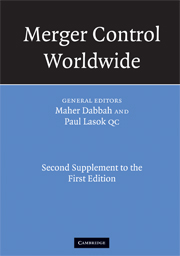Book contents
- Frontmatter
- Contents
- List of contributors
- Table of cases
- Table of legislation
- Introduction to the Second Supplement
- Introduction to the First Supplement
- 1 Argentina
- 2 Armenia
- 3 Australia
- 4 Austria
- 5 Belgium
- 6 Brazil
- 7 Canada
- 8 Chile
- 9 China
- 10 Denmark
- 11 European Union
- 12 Germany
- 13 Greece
- 14 Iceland
- 15 Italy
- 16 Japan
- 17 Republic of Korea
- 18 Malta
- 19 Mexico
- 20 The Netherlands
- 21 New Zealand
- 22 Norway
- 23 Singapore
- 24 Spain
- 25 Switzerland
- 26 Taiwan
- 27 Ukraine
- 28 United Kingdom
- 29 United States of America
- Index
28 - United Kingdom
Published online by Cambridge University Press: 30 July 2009
- Frontmatter
- Contents
- List of contributors
- Table of cases
- Table of legislation
- Introduction to the Second Supplement
- Introduction to the First Supplement
- 1 Argentina
- 2 Armenia
- 3 Australia
- 4 Austria
- 5 Belgium
- 6 Brazil
- 7 Canada
- 8 Chile
- 9 China
- 10 Denmark
- 11 European Union
- 12 Germany
- 13 Greece
- 14 Iceland
- 15 Italy
- 16 Japan
- 17 Republic of Korea
- 18 Malta
- 19 Mexico
- 20 The Netherlands
- 21 New Zealand
- 22 Norway
- 23 Singapore
- 24 Spain
- 25 Switzerland
- 26 Taiwan
- 27 Ukraine
- 28 United Kingdom
- 29 United States of America
- Index
Summary
Statutory guidance
The Competition Commission (the “CC”) has issued Water Merger References: Competition Guidelines (CC9). These provide further detail as to the manner in which the CC will approach its functions in this specialist area. The CC has also issued guidance on Disclosure of information by the Competition Commission to other public authorities (CC12) and Guidance on the use of interim measures pending final determination of merger references.
Time limits and prior notice
In November 2005 the Office of Fair Trading (the “OFT”) suspended the provision of confidential guidance and informal advice as described in the UK chapter in the Main Work in view of the changing nature of its role and resource constraints. The OFT has now announced that following a review it has reinstated the provision of informal advice. Informal advice will only be provided where there is a “good faith intention to proceed”, there is a genuine issue (merging parties will be expected to articulate the theory of harm which might make the case a genuine candidate for reference to the CC), and the OFT's advice would genuinely assist. Where OFT officials possess no particular insights that the parties and their advisers lack, the advice will be to this effect. Where an issue is complex and finely balanced, the OFT is likely to confine itself to advice on those terms, rather than necessarily giving a likely/unlikely to refer indication as was previously the case.
- Type
- Chapter
- Information
- Merger Control WorldwideSecond Supplement to the First Edition, pp. 155 - 158Publisher: Cambridge University PressPrint publication year: 2008

